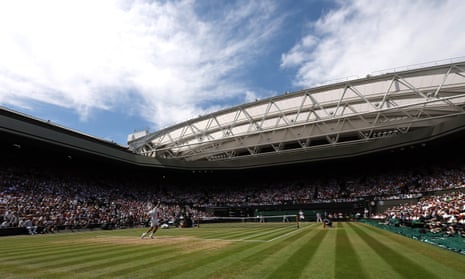Russian and Belarusian players will be allowed to compete at Wimbledon and the British grass-court tennis tournaments this year after the All England Club and the Lawn Tennis Association jointly opted to reverse their bans on the players for this season’s events.
After lengthy discussion between the tennis governing bodies, Russian and Belarusian players will be required to sign neutrality agreements in order to compete this year.
Both the players and Russian or Belarusian support staff must sign the neutrality agreements in order to be accredited at the events. The agreement is split into three categories: the players and staff will be agreeing that they are not representing the Russian or Belarusian states, they will confirm that they are not receiving funding from their states or companies controlled by the state, and they will not express support for the invasion or their home governments.
“We continue to condemn totally Russia’s illegal invasion and our wholehearted support remains with the people of Ukraine,” said Ian Hewitt, chairman of the All England Club, in a statement. “This was an incredibly difficult decision, not taken lightly or without a great deal of consideration for those who will be impacted.”
During the talks with the governing bodies and the UK government’s Department for Digital, Culture, Media and Sport last year, the possibility of player declarations had been discussed at length before the decision was made not to impose them. One of the concerns regarding a declaration last year was that Russian and Belarusian players could face trouble at home for publicly opposing the war. Therefore, they will not be required to explicitly criticise their governments or the invasion.
“We are now in a position where we believe that the declaration route is viable, which we didn’t last year,” said Sally Bolton, CEO of the AELTC, who also expressed her disappointment at the reaction from the tours last year.
“So an enormous amount of engagement and discussion with both the government and the tours has now got us to a place where we’ve clarified and developed the form of those declarations to ensure that we’ve got something that is workable in terms of implementation and enforcement.”
In light of Russia’s invasion of Ukraine, the question of how to treat Russian and Belarusian professional tennis players has proven one of the most divisive issues in the recent history of the sport.
While the men’s ATP Tour, the Women’s Tennis Association and the International Tennis Federation have allowed the players to compete as neutral athletes around the world without being required to sign a declaration, the AELTC and LTA decided to ban Russian and Belarusian players from their events.
Their decision prompted a sharp reaction from the ATP and WTA, which punished the AELTC by withholding ranking points from last year’s event. The ATP and WTA later imposed fines on the LTA and AELTC totalling a combined $2m (£1.6m). During discussions between the governing bodies this year, the LTA feared that the threats from the ATP and the WTA to suspend its events from their tours constituted an “existential threat” for British tennis if its events were not to go ahead.
“The effect on British tennis of the LTA being expelled from the tours would be very damaging and far reaching for the game in our country. The impact would be felt by the millions of fans that follow the sport, the grass roots of the game, including coaches and venues which rely on the events for visibility and to bring new players into the game, and of course professional British players,” said the LTA.
The AELTC board unanimously approved the new regulations for Russian players and the decision means that points will be restored for both men and women at this year’s event. The AELTC and LTA say they have spoken with Ukrainian players in order to explain the decision, and also separately with Russian and Belarusian players.
